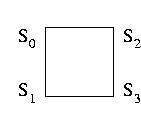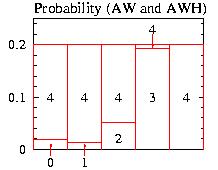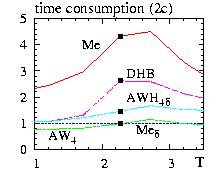Spins with one components: S=±1
Energy=S.hlocal=S.h
P(x)=e-Energy/T
=e-h.S+...
for 4 spins on a plaquette:

P(x)=e -h0S0-h1S1 -h2S2-h3S3 -S0.S1-S1.S3 -S3.S2-S2.S0
There are 81 possible local fields states (34) for the square lattice (two neighbors for each, three possibilities: -2, 0, +2) and for each case 16 possible spins states (2SUP>4).

The Alias Walker (AW) algorithm re-arrange the N probabilities into N boxes of equal weight with 2 possibilities in each box. It is not difficult to choose one of the box with a random number and an (int) command and choose the correct possibility with an if condition. The picture shows one possibility for 5 states. In our case we have 24=16 states.
